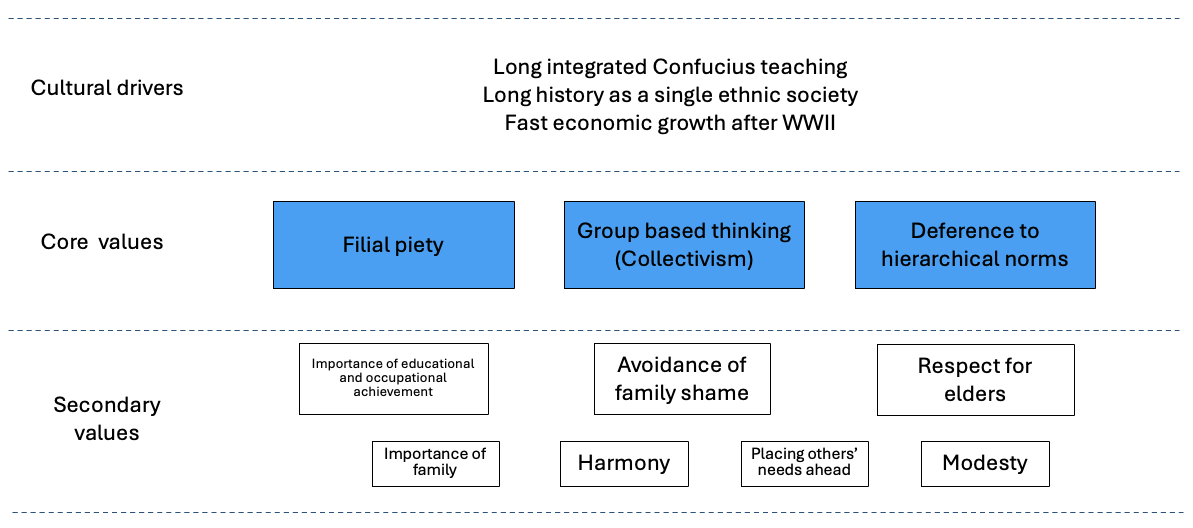Asian cultural values – beyond the list
The Asian Values Scale (AVS), developed by Kim, Atkinson, and Yang (1999), identified six core Asian values through value items drawn from extensive literature review, expert consultation, and surveys with diverse Asian American college students. These core values are:
Collectivism
Conformity to norms
Emotional self-control
Family recognition through achievement
Filial piety
Humility
Together with the AVS, I came across six major studies that collectively identified about 20 independent Asian values. Some of these studies modified the 1999 AVS, while others took a different approach, such as Geert Hofstede’s Cultural Dimensions Theory, which used large-scale, global surveys of IBM employees across more than 50 countries to examine cross-cultural values.
Below, you’ll find thirteen Asian values mentioned more than once from these six studies, with brief definitions and the number of studies in which each value appeared. For example, collectivism was identified in all six studies.
Collectivism (6/6 studies): Prioritizing group or family needs above individual interests.
Deference to authority/hierarchy (6): Respecting elders and superiors; accepting social ranking.
Conformity to norms (5): Adhering to social, family, or cultural expectations.
Self-control/restraint (5): Avoiding open expression of emotions to maintain harmony.
Humility (5): Practicing modesty; avoiding self-promotion.
Harmony (4): Avoiding conflict; maintaining smooth social relations.
Filial piety (4): Showing respect and care for parents and elders.
Family recognition through achievement (3): Bringing honor to the family through one’s accomplishments.
Placing others’ needs ahead (3): Sacrificing for others’ welfare.
Importance of family (3): Placing family at the center of decision-making and values.
Avoidance of family shame (3): Avoiding actions that could dishonor the family.
Importance of educational and occupational achievement (2): Striving for success in school and career.
Respect for elders (2): Valuing tradition and the wisdom of previous generations.
Comparing my perspective on Asian values with the findings of these major studies, I see both strong similarities and important differences.
Asian cultural values (Joonki Song, 2025)
Joonki Song: This perspective is based on my own life experience, my work in cross-cultural consulting, and my executive coaching with approximately 50 Asian Americans.
First, the top two values from the research - collectivism and deference to authority/hierarchy - closely match two of my core cultural forces. I also elevate filial piety as a core value. Together, these three form the foundation from which most of the other secondary values emerge.
Second, even though all secondary values are important for Asian Americans, I believe they are derived from the core values. This distinction matters, because focusing on the core values helps explain the origins of the others. For example, “avoidance of family shame,” mentioned in three out of six studies, is largely driven by both group-based thinking and filial piety. Based on filial piety, we strive to make our parents proud; when we fall short of what our parents or community define as success (influenced by group-based thinking), we feel a sense of shame about ourselves and our families.
Third, I would be cautious using “humility” as an Asian value. In the AVS, humility was measured with three statements: “Modesty is an important quality for a person,” “One should not be boastful,” and “One should be humble and modest.” If I had to choose a single word to represent these, it would be “modesty.” In my view, true humility involves more than modesty—it also includes an accurate self-assessment and a willingness to acknowledge mistakes, which are not always encouraged in Asian cultures.
Fourth, beyond defining and selecting them, I believe that Asian values strongly impact the life journeys of all Asian Americans. For example, one Asian American client, always the high achiever, stayed in roles that drained her because she believed she “had to do well at everything.” The drive to prove herself, to parents, teachers, and peers, kept her from asking for help or acknowledging what she truly wanted.
Do you resonate with these Asian cultural values? Which ones have shaped you the most?
How have these values supported you or held you back on your journey to becoming a fulfilled person and an effective leader?
I am writing a book about the relationship between Asian cultural values and leadership among Asian Americans. At its core, the book explores how self-authoring, a concept from Robert Kegan’s Adult Development Theory, is essential to effective and sustainable leadership. While Asian core values such as filial piety, group-based thinking, and deference to hierarchical norms have many positive aspects, I believe they can also stand in the way of Asian Americans becoming truly self-authoring.
Understanding the structure and sources of Asian values helps us recognize which values serve us and which ones we might need to rethink as we define our own paths as leaders and as individuals.

